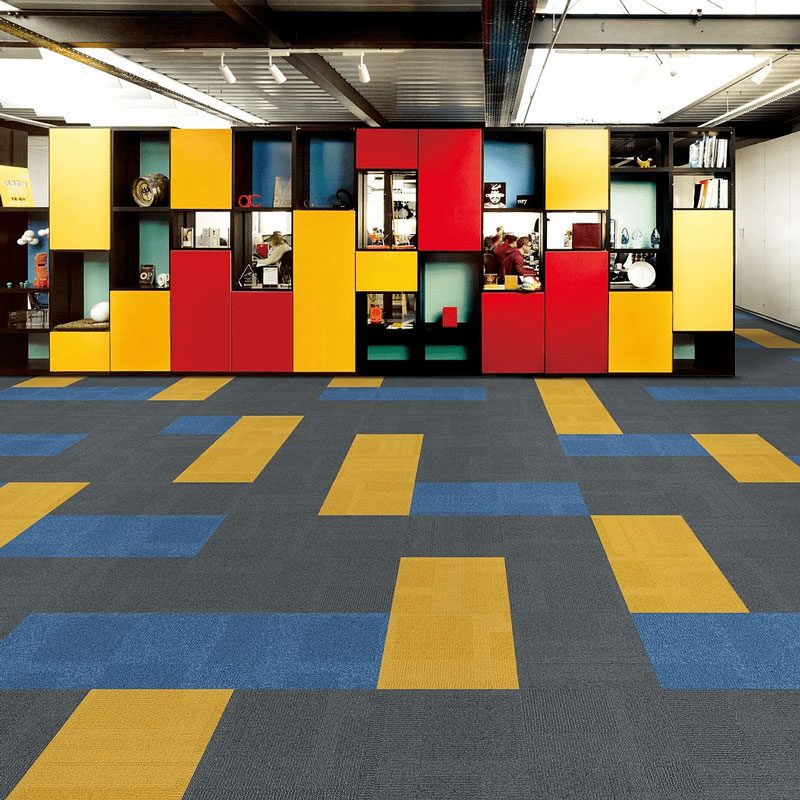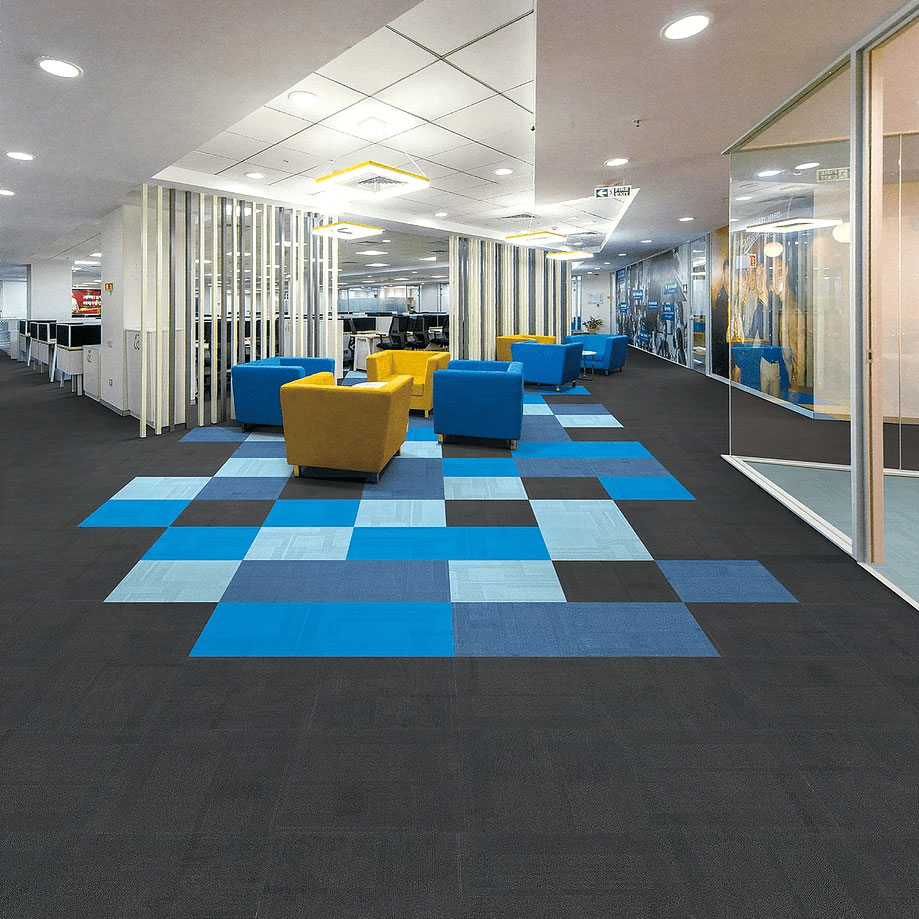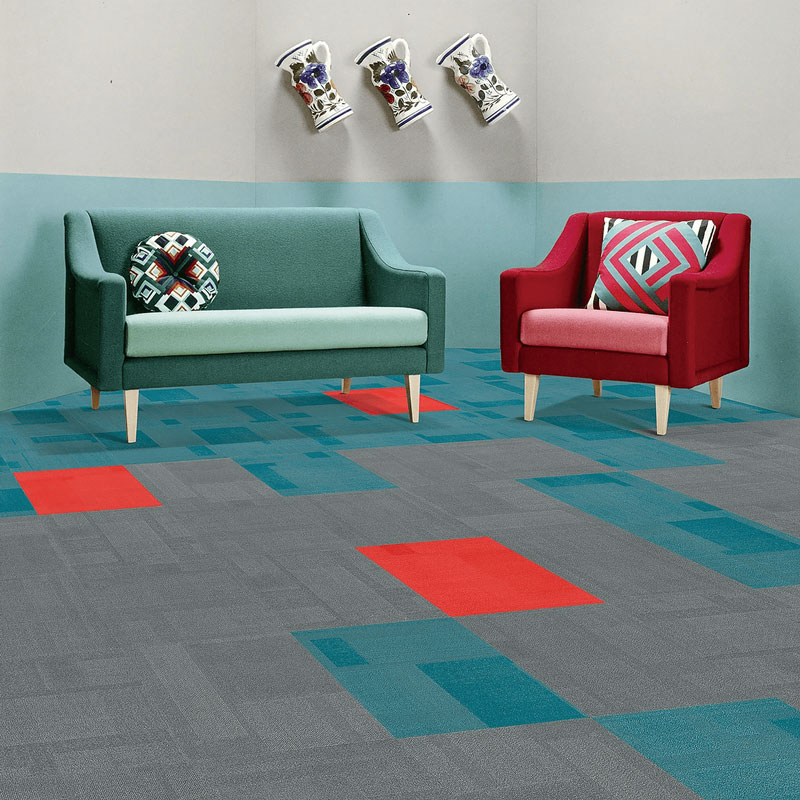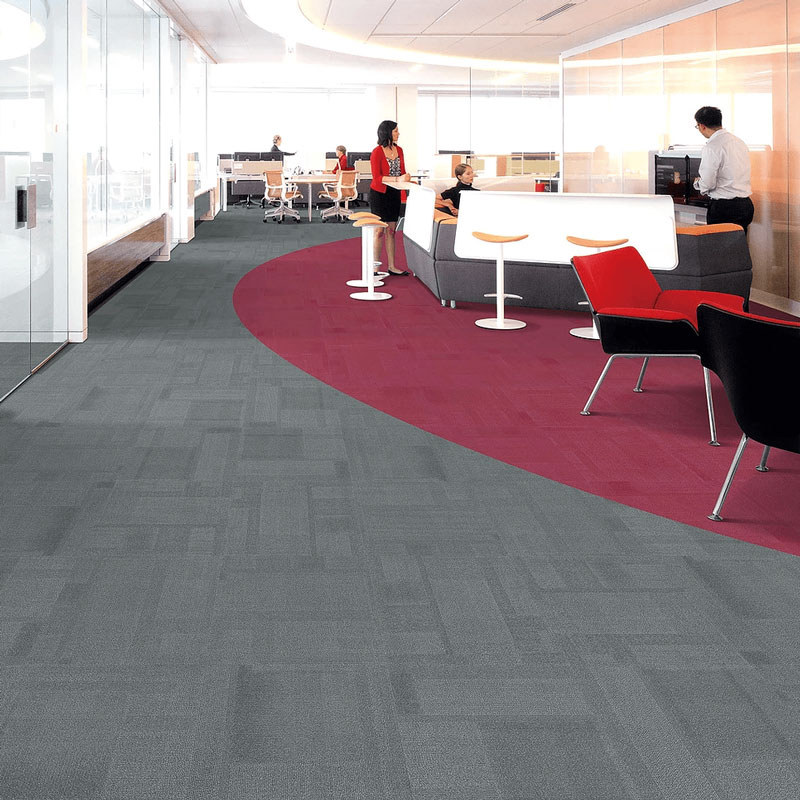Thanks to the impressive number of unique benefits they offer, carpet tiles are becoming increasingly popular in homes, schools, and businesses.
We’ve put together a guide to carpet tiles to cover any possible questions you may have including:
- What are carpet tiles?
- What are the advantages?
- What types of sizes and styles are available?
- What are the different patterns and layouts?
- Can you install them by yourself?
- How much do carpet tiles cost?
- Where can they be installed?
- What areas should they not be installed?
What Are Carpet Tiles?
Carpet tiles — also known as square or modular carpet — are squares cut from rolls of carpet.
They are specially designed to fit together easily and quickly. Carpet tiles are secured to the floor with nails, staples, or glue. The tiles generally consist of an upper layer of pile attached to a backing.
What Are the Advantages?
Beyond the warmth and inviting comfort that only carpet can offer, they boast even more advantages than traditional broadloom carpet. Here we’ll break down the top benefits and what makes them so unique.
1. DIY-Friendly and Easy to Install
If the ability to install flooring yourself is an important feature to you, carpet tiles are a great option to consider. When it comes to user-friendly, DIY installation, they are one of the best choices in the flooring market. Laying carpet tiles can be done easily, quickly, and are designed with simplicity in mind.
Since they are relatively small in size, they are easier to carry and get positioned in place. Compare this to maneuvering a huge roll of carpet and the advantage is clear. Generally, broadloom carpet requires professional installation. Additionally, most carpet manufacturers do not deliver carpet rolls to residential addresses.
Alternatively, laying carpet tiles go down faster, are easier to deliver, and require less skill than other types of flooring to ensure a smooth, even final look.
Although they can certainly be a DIY-friendly flooring option, we can get you in touch with over 200 professional layers Australian-wide if you prefer the help of a tradesman. Feel free to get in touch with us if you have any questions regarding DIY carpet tile installation.
2. They Offer Endless Possibilities for Creative, Colourful Designs
Carpet tiles are an ideal way to express your creativity and unique style. You can mix and match colours, add a pop of colour, create patterns — whatever you can dream up!

By using different layouts, carpet tiles can add a unique touch to your office.
Family rooms and playrooms make especially great areas for adding some flair and fun. The options are endless!
3. They Can Be More Affordable
In general, carpet tends to be noticeably less expensive than hard flooring options. When it comes to carpet options, tiles tend to be a bit pricier than traditional carpet, but that cost comes down if you handle the installation on your own. This saves on the cost of carpet cushion, delivery, and labour and makes the cost of carpet tiles less expensive than broadloom carpet once everything is factored in.
4. Easy To Maintain
Carpet tiles are extremely easy to clean and care for: simply vacuum regularly as you would with any carpet. Since they are typically lower pile, they tend to trap less debris and dirt.
Every now and then, a thorough shampoo can help remove any built-in stains completely. For tougher stains, it is even possible to pop out one or two tiles, give them a deep cleaning, and pop them back into position.
5. Highly Durable
Carpet tiles are heavy duty and built to last.
They tend to be looped, low pile, and very tight. They are purposely designed to hold up to heavy traffic in commercial flooring applications, making them ideal for the demands of busy households with pets or kids.

Carpet tiles are ideal for highly trafficked areas such as waiting rooms or shared common spaces.
Additionally, many carpet tiles feature striations, patterns, or flecks that add design flair while also camouflaging imperfections so the tiles stay looking better, longer.
Also, many tiles feature enhanced stain protection. Bonus: They hold up extremely well to rolling office chairs and allow them to roll smoothly.
Beyond being tough and resistant to stains, individual tiles can be replaced in the event of damage. This means just one or two tiles can be removed instead of having to rip out the entire carpet.
Tip: Be sure to save some extra tiles to have on hand in the event you need replacement tile or make a wrong cut.
6. Less Waste and No Awkward Seams
Standard carpet rolls tend to come in limited widths, with 12 feet being quite common. This means a 13 foot wide room will need an additional foot of carpet ordered if your roll is 12 feet wide. This creates waste and awkward seams (especially if the carpet is looped). Along with detracting from the room’s visual appeal, the seams are also more vulnerable to excessive wear over time.
Since carpet tiles are individual pieces, they generally fit rooms better and lead to less waste and unattractive seams. Thus, they prove especially wonderful and versatile in rooms with complex layouts.
7. Can Be Better For Indoor Air Quality and Allergies
Since carpet tiles are generally flatter and low pile, they trap less dirt and are better for indoor air quality than traditional wall to wall carpets. This is a great feature for home or business owners that are concerned about air quality or potential allergens.
8. More Resistant to Moisture and Water Than Traditional Carpet
Due to their tight weave and backing, carpet tiles tend to be more resistant to moisture and water than traditional carpet. Does this mean they are waterproof? No. If there is a flood, you will almost certainly be replacing them (or just about any other flooring).
However, for areas prone to minor moisture issues, pet accidents, or occasional spills, carpet tiles will hold up better than wall to wall carpet and have a better chance of protecting your subfloor from damage. Also, as already mentioned, they are a breeze to replace in the event of damage.
What Sizes Do They Come In?
Although it varies by brand, carpet tiles typically come in these sizes:
- 18″ x 18″ (Most common)
- 24″ x 24″ (Most common)
- 12″ x 12″
- 39″ x 39″
- 18″ x 36″ (These rectangular patterns are not as common, but these plank options do exist)
What Styles Are Available?
Carpet tiles come in a vast array of colours and patterns to choose from. Tiles can be altered in different directions, staggered, or coordinated with the surroundings to create visual intrigue.

By using a range of colours, you can suit any interior design style or colour palette.
Regardless of your interior design style or colour palette, it is almost a guarantee that you will find an option to complement your choices.
Design Tips and Pattern Ideas
Carpet tiles offer a host of ways to express your creativity and personal style. You can choose multiple colours, creative layouts, fun designs, or all of the above!
Here are a few carpet tile design and pattern ideas for your inspiration:
- Monolithic vs Quarter-Turn Layout – The monolithic pattern (not really a pattern at all) is the basic way to lay carpet tiles. It is a straight line, essentially. The quarter-turn layout — turning the tiles at a 90 degree angle — is a simple way to add some intrigue.
- Pops of Colour – Using a neutral colour as the base (i.e. gray) with a pop of colour (yellow or light blue) is a fun, easy way to play with bold colours and add interest, personality, and dimension to a room. The options are truly endless!
- Mix and Match – You can mix and match different patterns, textures, sizes, shapes, and colours.
We could spend hours and hours covering the potential ideas, but the best way to get inspired is by seeing the possibilities for yourself. For that, we absolutely love this article on 21 ways to arrange carpet tiles for reference.
Where Should You Avoid Installing Carpet Tiles?
When it comes to installation, there are some special considerations to be aware of:
- Steps should be avoided as the tiles do not adhere well without the addition of unattractive rubber or metal stair noses. In some cases, matching broadloom carpet can be used on stairs.
- They do not do well over certain types of vinyl. Be especially cautious if you have VAT (vinyl asbestos tile) as the peel and stick adhesive can create a significant health hazard when tiles are removed.
- They do not adhere well to shiny or very smooth vinyls. In this case, the surface may need to be roughed up prior to installation.
How Do You Clean Carpet Tiles?
Carpet tiles are easy to clean and care for. Vacuuming once a week (or more in areas of high traffic use) is typically all it takes to keep them looking great.
If an individual tile gets especially dirty, you can remove it and scrub it in the sink. However, make sure to let it completely air dry (avoid putting it on a heat source) before you place it back in to avoid any mould issues.
What Do I Need to Install Them?
Here are the main tools needed for DIY carpet tile installation:
- Heavy Duty T-square (30″ long to accommodate carpet tiles)
- Double-sided carpet tape
- Utility Knife
How Much Do Carpet Tiles Cost?
While the pricing of carpet tiles varies greatly between companies, you can expect to pay an average of $30 per sqm (not including installation). Of course, the style, quality, and other factors greatly affect the pricing.
Some options may run as low as $20 per sqm while higher end options will run closer to $50 sqm.
Feel free to contact us and we would be glad to put together a quote for your project.
Where Can I Buy Them?
At The Online Flooring Store, we only offer only the highest-quality carpet tiles, carefully chosen and sourced by our experienced team. If a product does not meet our rigorous standards, it simply does not stand a chance of being offered to our customers.
We pride ourselves on being a family-owned, customer-focused business and we would be honoured to help you with your project, whether it’s a large scale commercial building or a small playroom for your kids. Whatever the project, we are here to help from start to finish.



